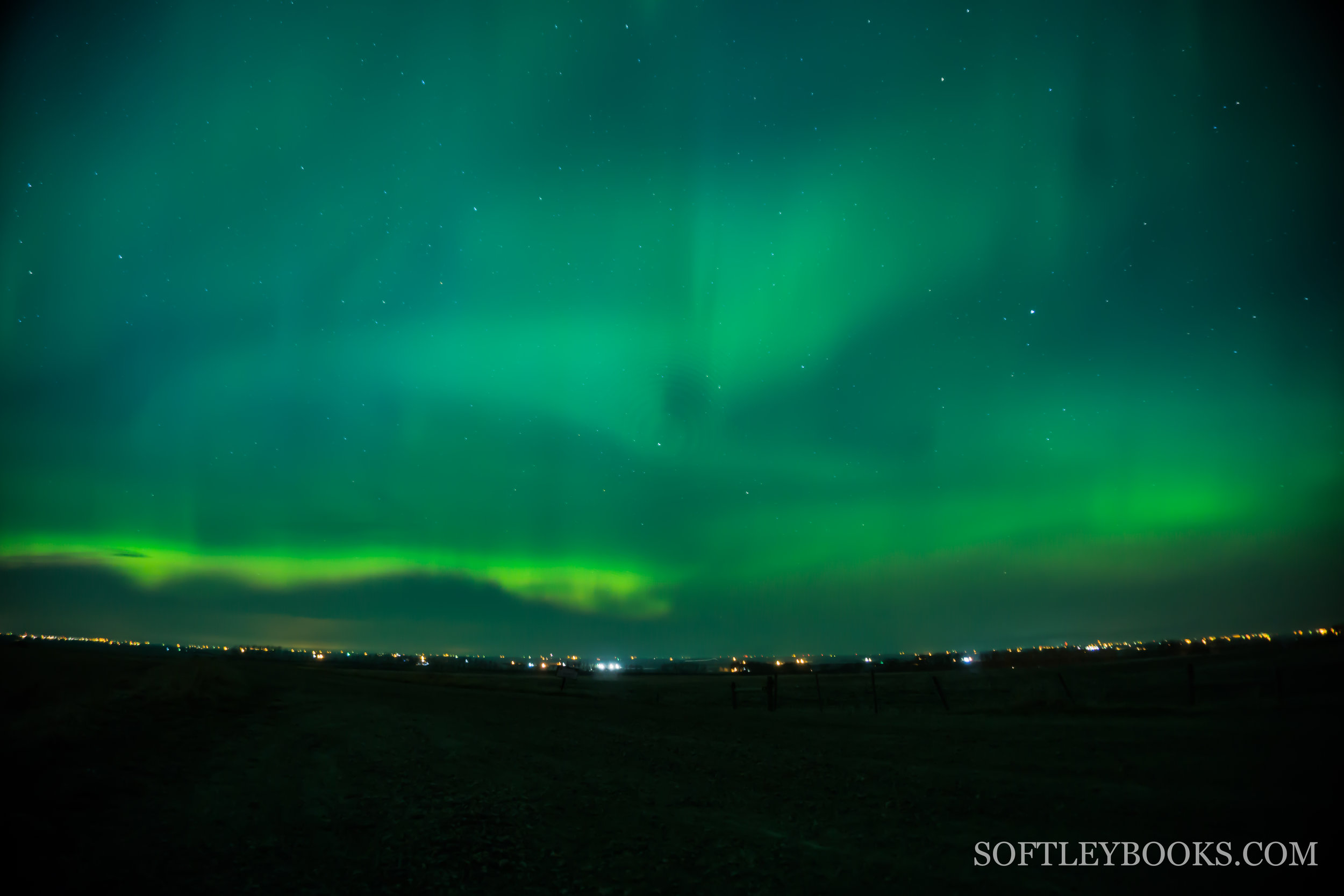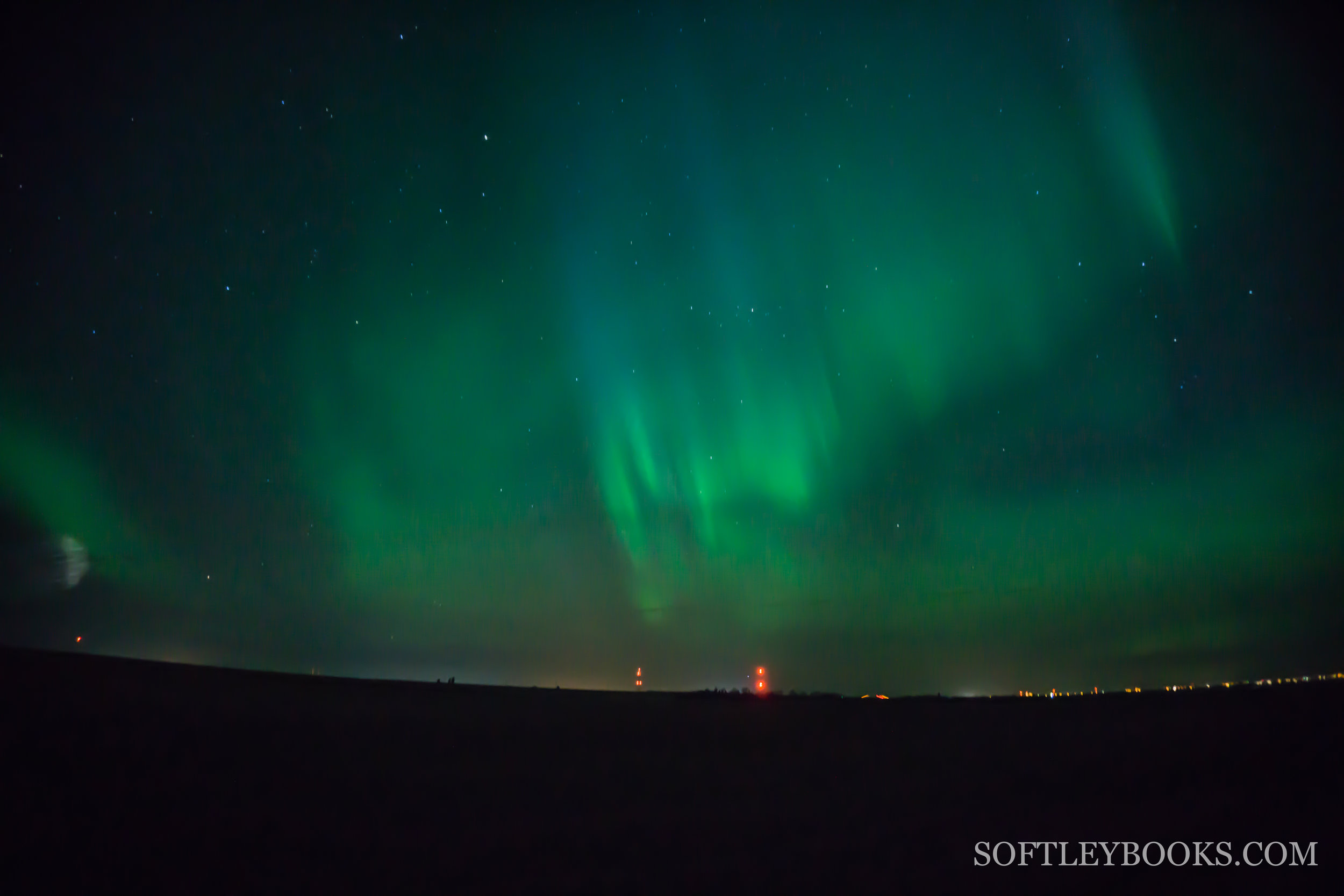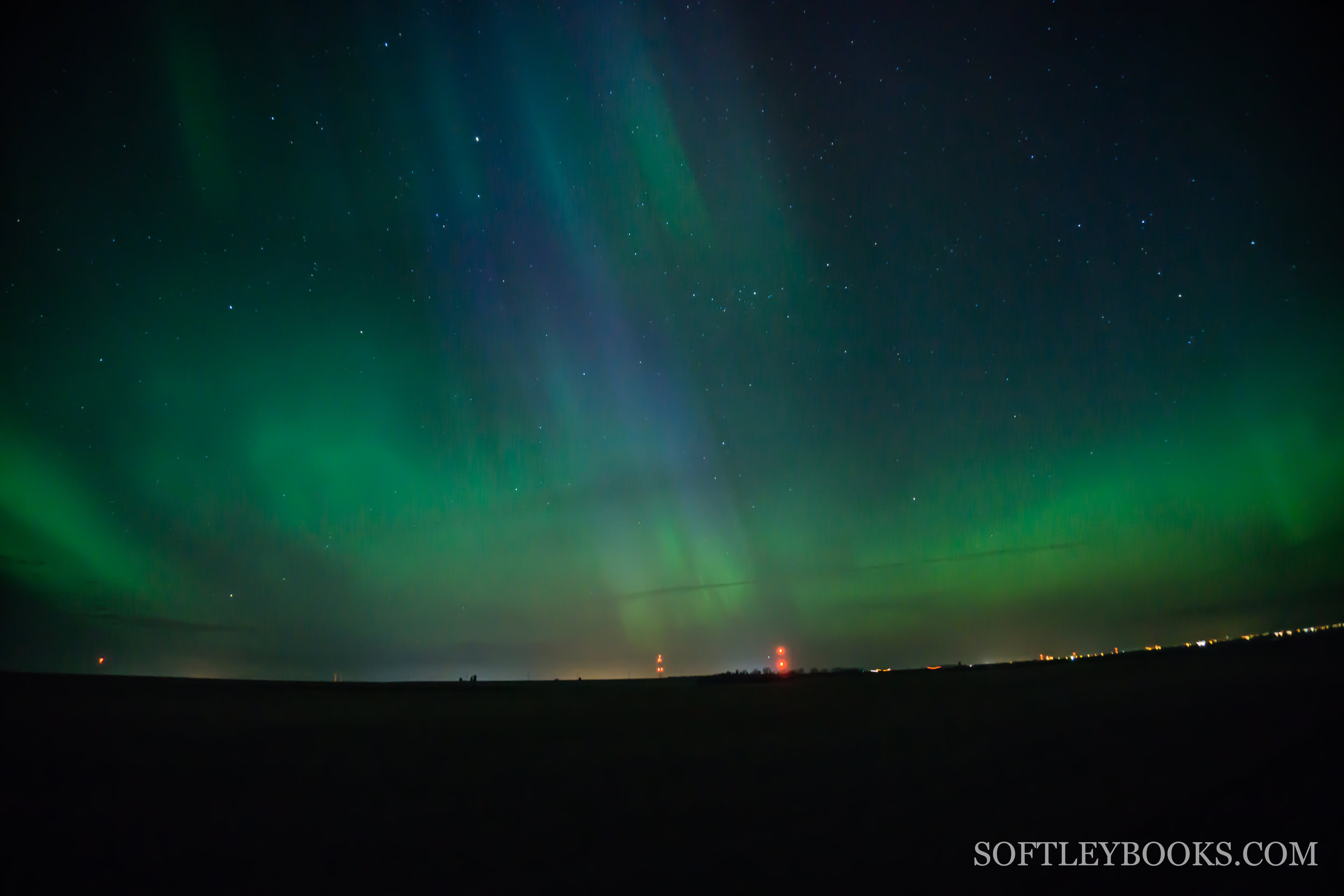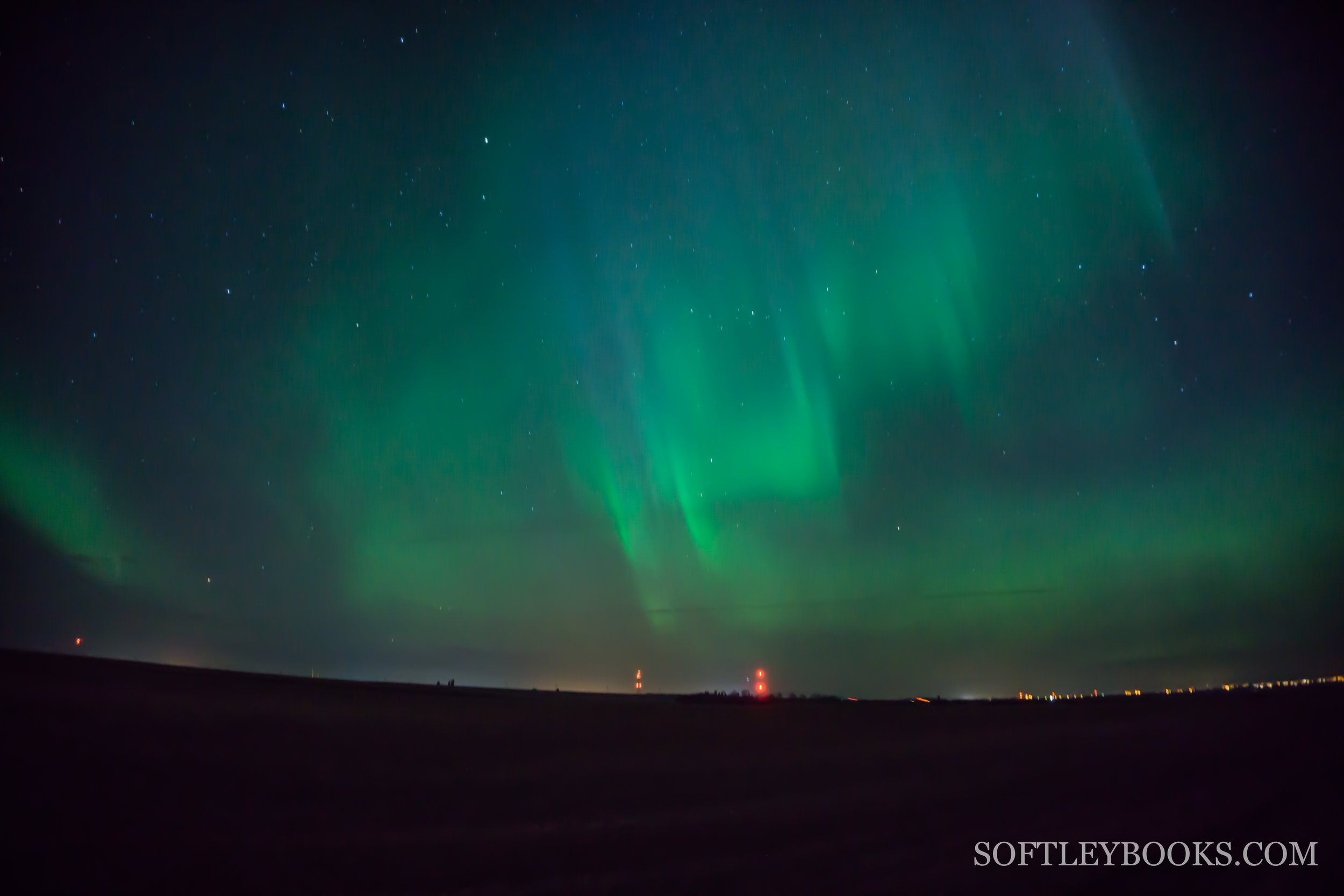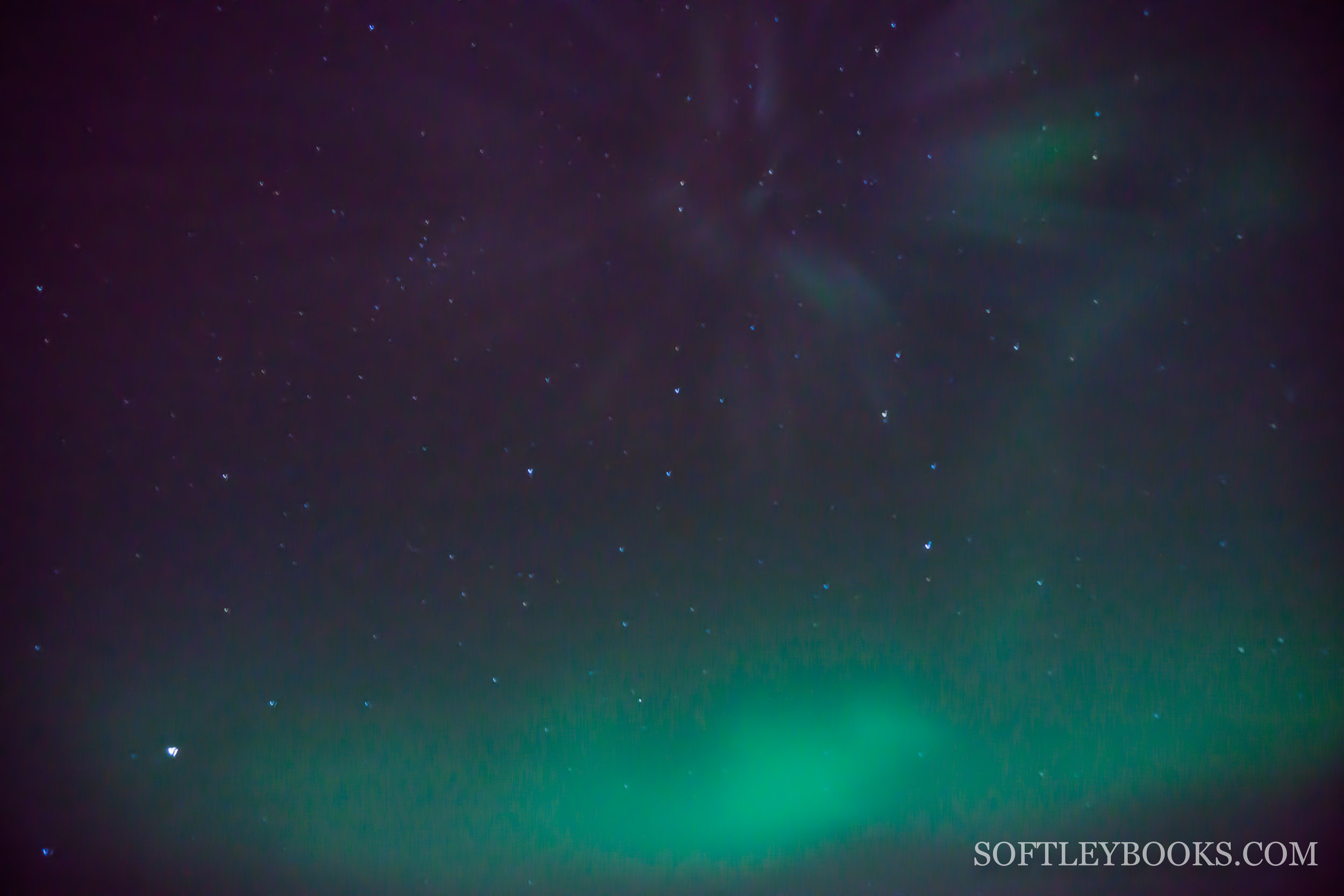It appears at first as a faint green haze no more noticeable than a slight wisp of cloud. I'd been watching for it. I always watch for it. It takes just a moment for me to be certain. It is not cloud. It is not the atmospheric halo of town lights.
It isn't moving in a noticeable way; isn't shimmering or dancing like it does in National Geographic films. One moment it's faint; only the size of a quarter. The next moment, though I haven't taken my eyes off of the ethereal green light, it has smeared like melting oil pastel across a wide patch of sky. The smudge continues to grow. Without appearing to move at all, the vague mirage-like tendril undergoes transformation after fleeting transformation as though defying my eyes to accurately capture it. It cannot be held. It cannot be defined.
I know immediately what it is. I've seen it many times before, though far less often in recent years. I know that it will grow as the sun sinks further behind the horizon. I know also that I have no hope of seeing it any more clearly while I'm on the well lit and heavily travelled highway. I hesitate a moment. I have somewhere to be. I have responsibilities; money to earn. It's already late and I have a very early morning and a long day of work ahead.
Without another thought, I pull impulsively off the highway in search of a quiet backcountry road.
I'm on my way north to Edmonton from Calgary for a weekend gig. I make this drive all the time; usually at night. I love driving at night. My mind works best after sunset. My thoughts flow more freely in the dark. It has been this way for as long as I can remember.
Aurora Borealis, 51°38'74"N, 113°96'65"W, April 21st, 2017
I spent a little better than half my childhood in Manitoba. We lived on the very edge of Winnipeg. The end of my street was the end of the city. After that, only scattered farms, narrow train tracks and distant grain elevators made any noise or cast any light. The sky was dark and the stars were bright.
In the winter, I would lay in the deep snow, enjoying the early sunset. Some of my favourite days were the shortest of the year; when dusk was upon me even as I walked home from school; as the indigo sky cleared after a snow storm. I loved the silence after a heavy snowfall. The thick sheets of white muffled the sound of the neighbourhood. The world would fade away as I travelled the stars alone.
I recall spending hours gazing up at the night sky. Long after I was supposed to be asleep I'd sit at my bedroom window trying to catch a glimpse of something - anything. I would marvel at the pinpricks of light that formed familiar patterns. With each twinkle I would add imaginary figures in my head - numbers much too large for me to know - as I tried to guess just how old the light was; just how long it had taken to reach my eye. I hated it when my bedroom window was dirty because the marks would obscure my view of the moon. I couldn't make out the details of the maria and the craters and the mountains with a dirty window.
In the summer, I spent most of my time at family cottages and cabins on Lake Winnipeg and the Lee River. Here, the darkness and peacefulness was profound. There were no lights to interfere with the sky and no sounds other than those created by the multitude of birds and insects and the vast flowing water. On holiday from school, my parents would allow me to stay up stargazing late into the night and they soon bought me a telescope through which I could see Saturn's rings, Jupiter's spot and the features of the moon as though I was flying over it in a plane.
With a watchful eye and away from light pollution, I've managed to sight most of the celestial vistas that it is possible to see in the northern hemisphere with naked eye or moderate telescopic lens. I've seen the northern lights many times. I've seen supernovae and comets. I've seen meteor showers so heavy that they might have been sparkling rain drops. I've seen eclipses and alignments; space stations and galaxies.
No matter how much I've seen, I have always hungered for more. Always kept my face turned upward; my eyes on the stars.
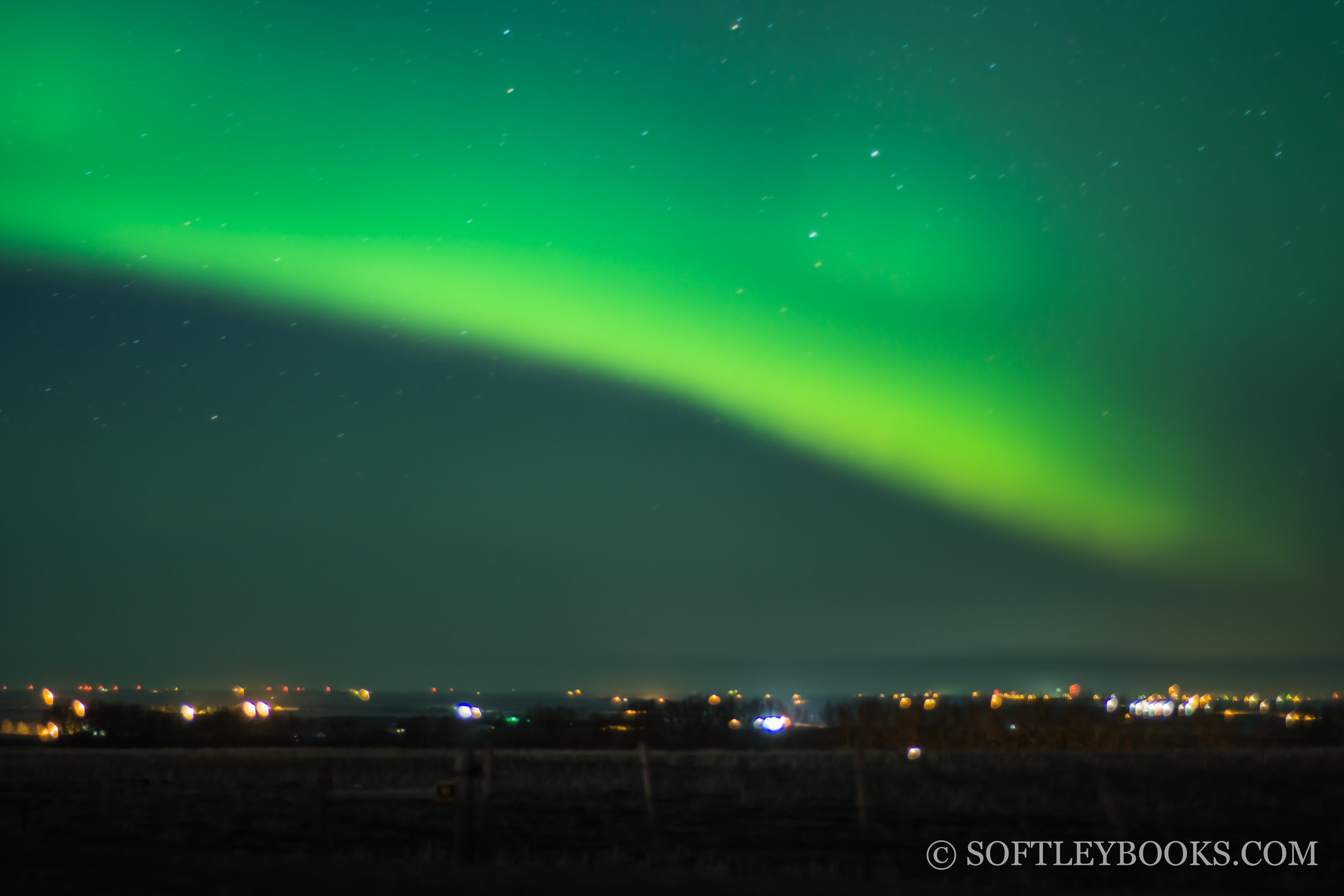
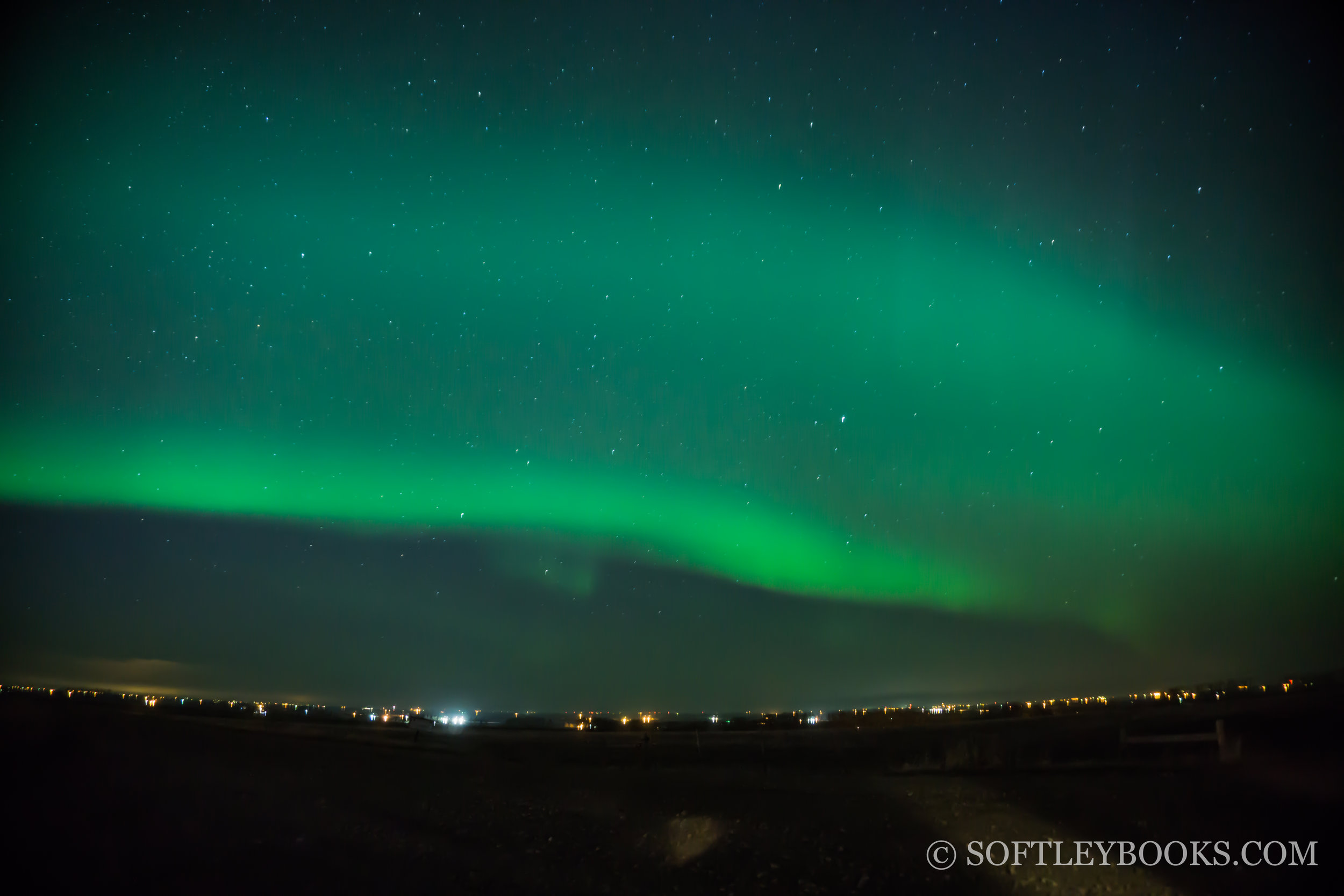
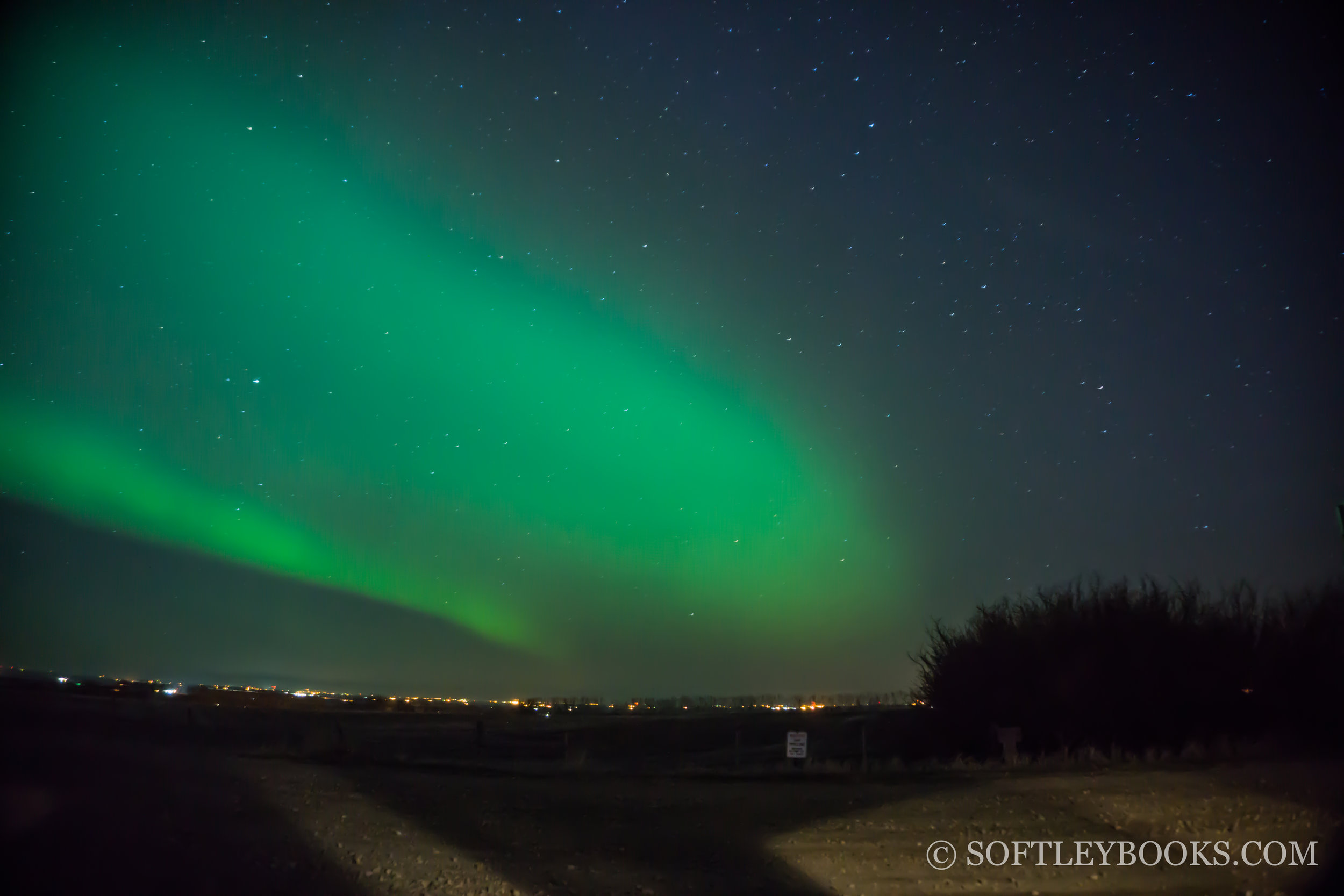
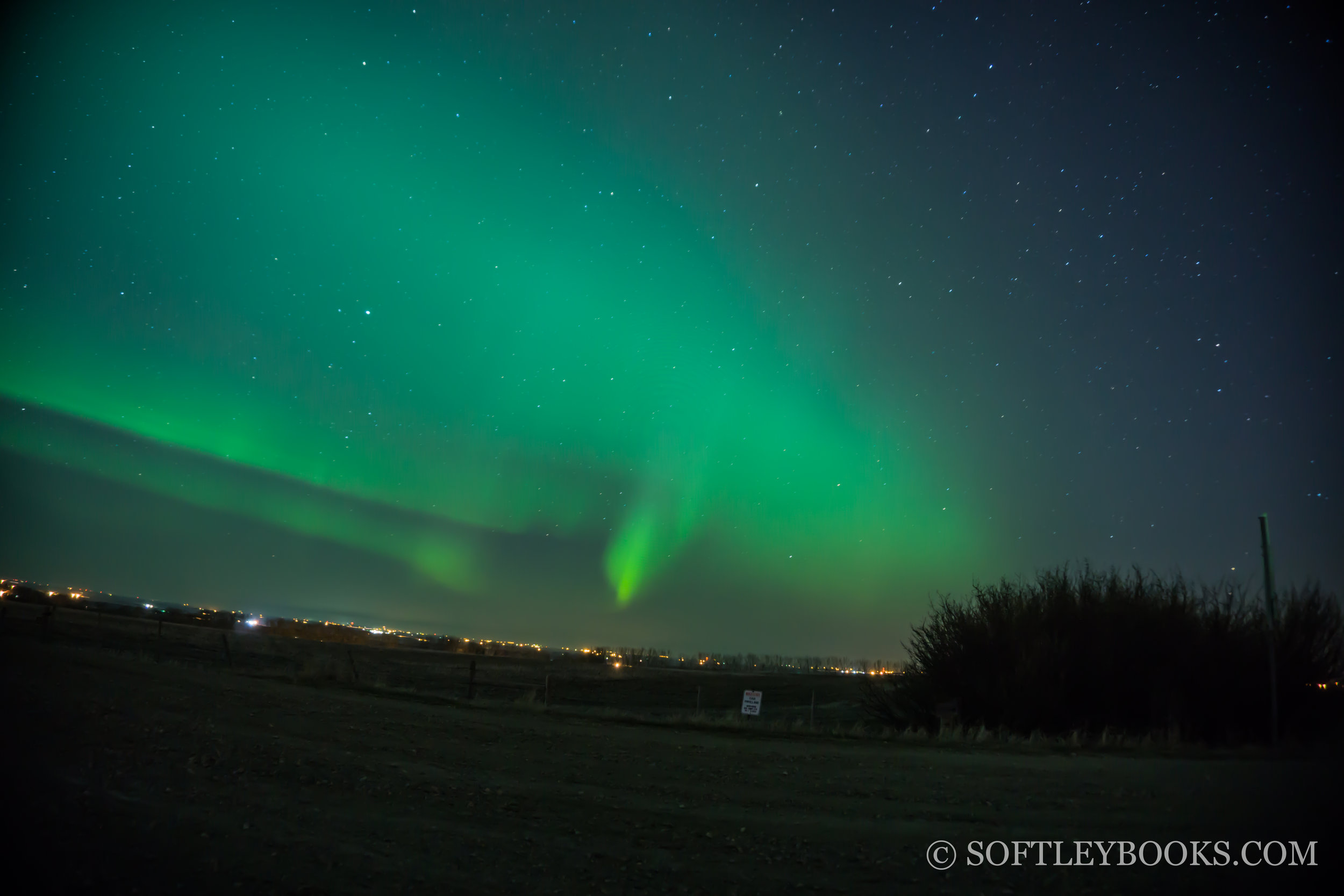
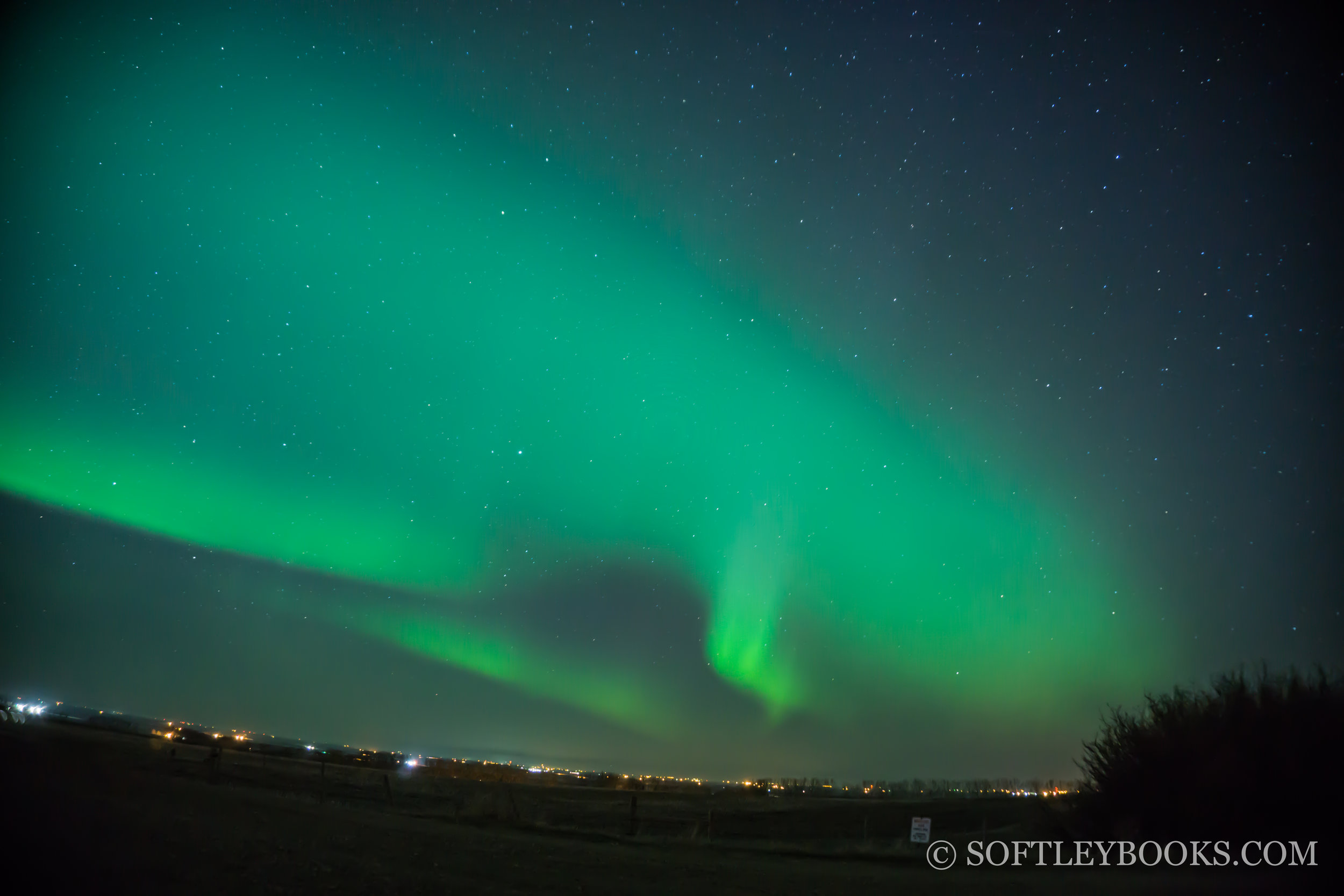
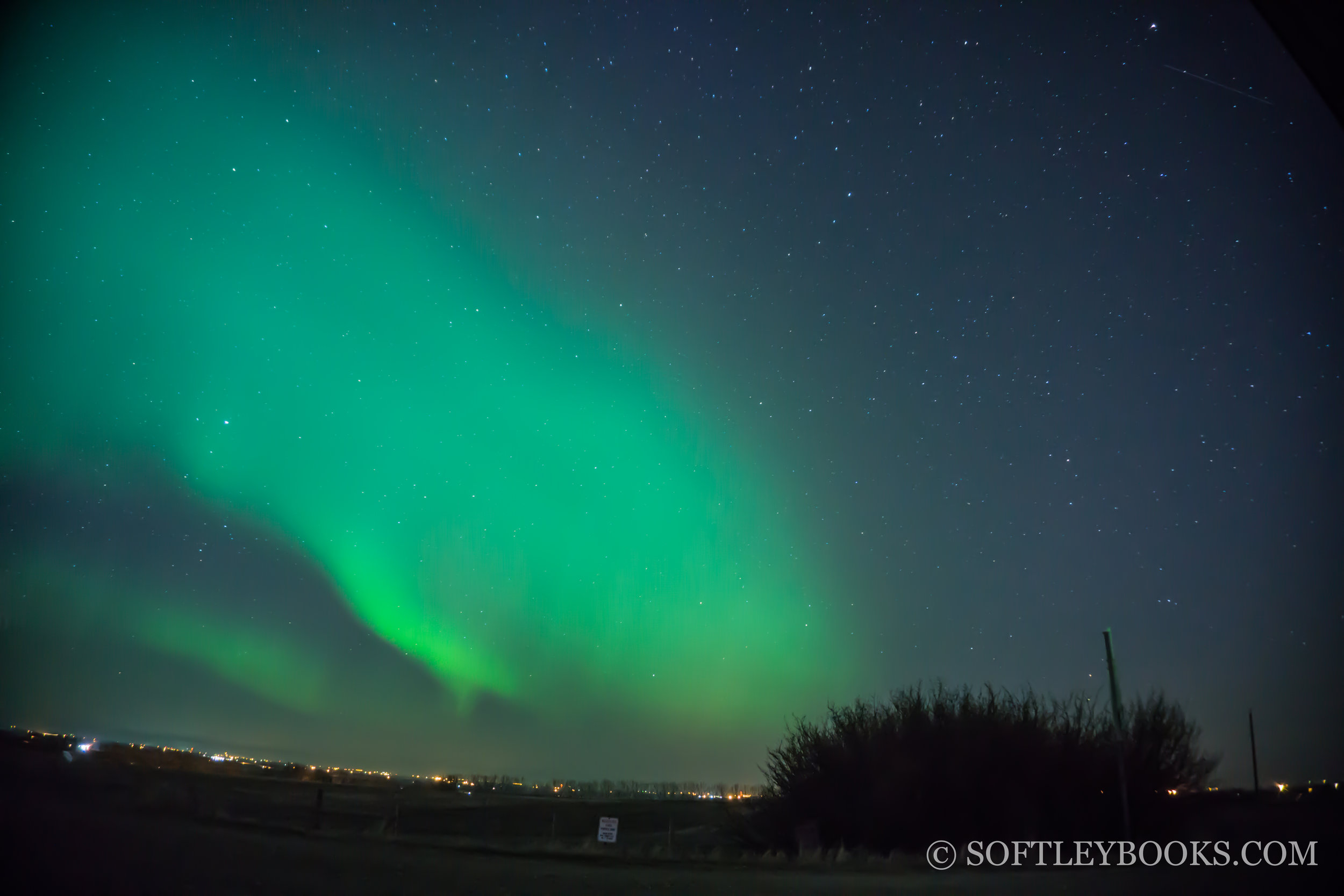
When I moved to Calgary, stargazing became more difficult. It was a larger, more sprawling city with brighter lights that battled the night sky. The towns that dotted the landscape outside of Calgary, too, seemed to be domed in bright hemispheres of glow so that it was more difficult to find dark patches than in Manitoba with its endless wide empty lakes.
Even in the artificially bright Calgary skies I was able to keep up the habit of gazing upward. I became skilled at looking for and spotting even the slightest hint of astronomical phenomena. The challenge of peering through the street-lamp haze to sight something rare; something to which most others remained oblivious made success all the more exciting.
As a family, we took regular road trips and often travelled country highways on vacation. We traversed Western Canada and often found ourselves beneath open and unchallenged sky at night. We crossed the prairies regularly on trips back to Winnipeg, travelling under the immense star field as though in our own space capsule. I often slept through the daytime journey, waking only when the sun began to set. I would watch as the sun lit the sparse islands of cumulonimbus clouds afire. I would tirelessly look on as the blurred and muted world slipped by; as the stars shone clearer and clearer.
If I was lucky, I might catch sight of a meteor or the northern lights or the dust streaked lens of the Milky Way. If I was less lucky, I would drink in more common sights: familiar constellations, the silver anti-daylight of the round full moon or the scattered flicker of lightning in the cloud tops.
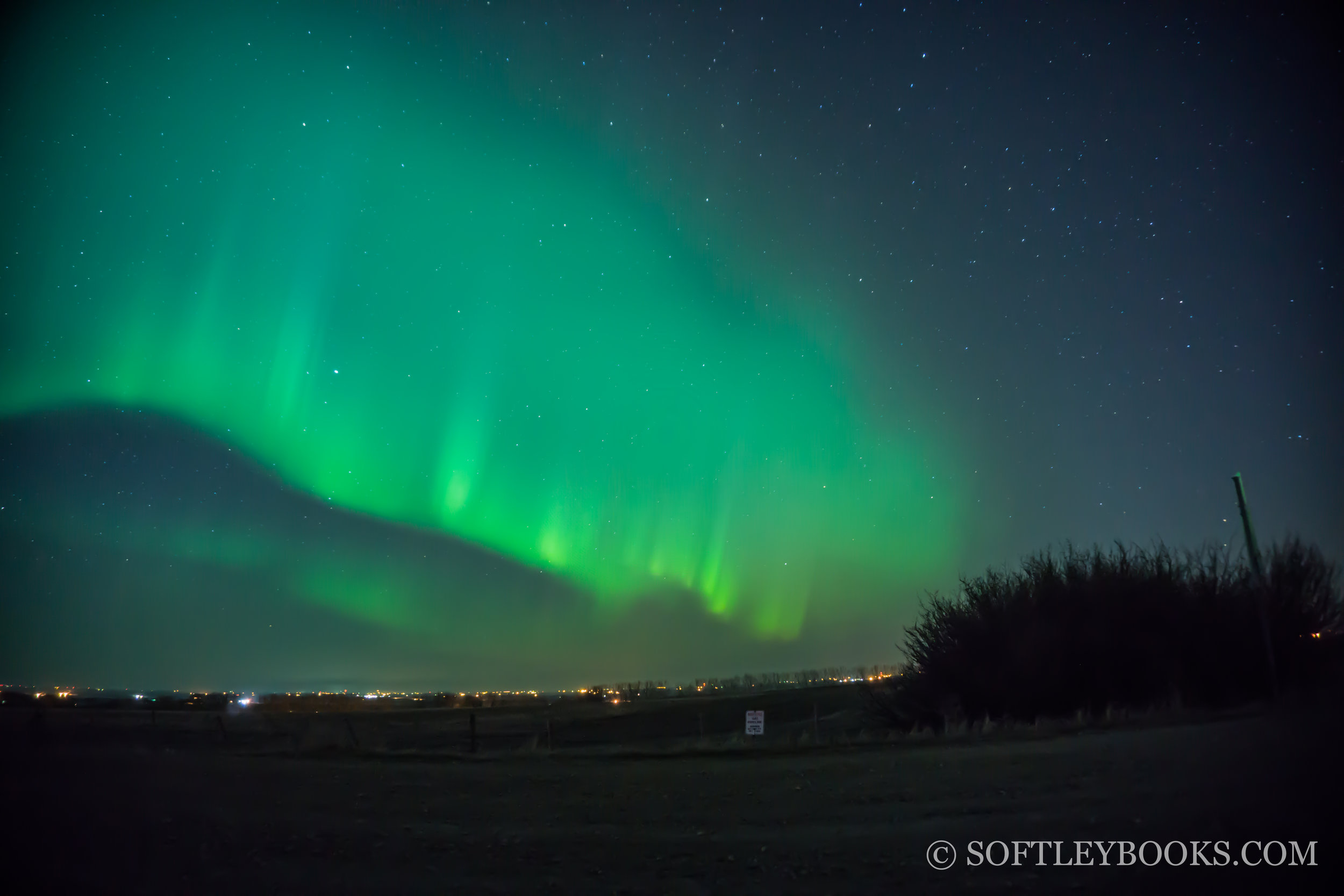
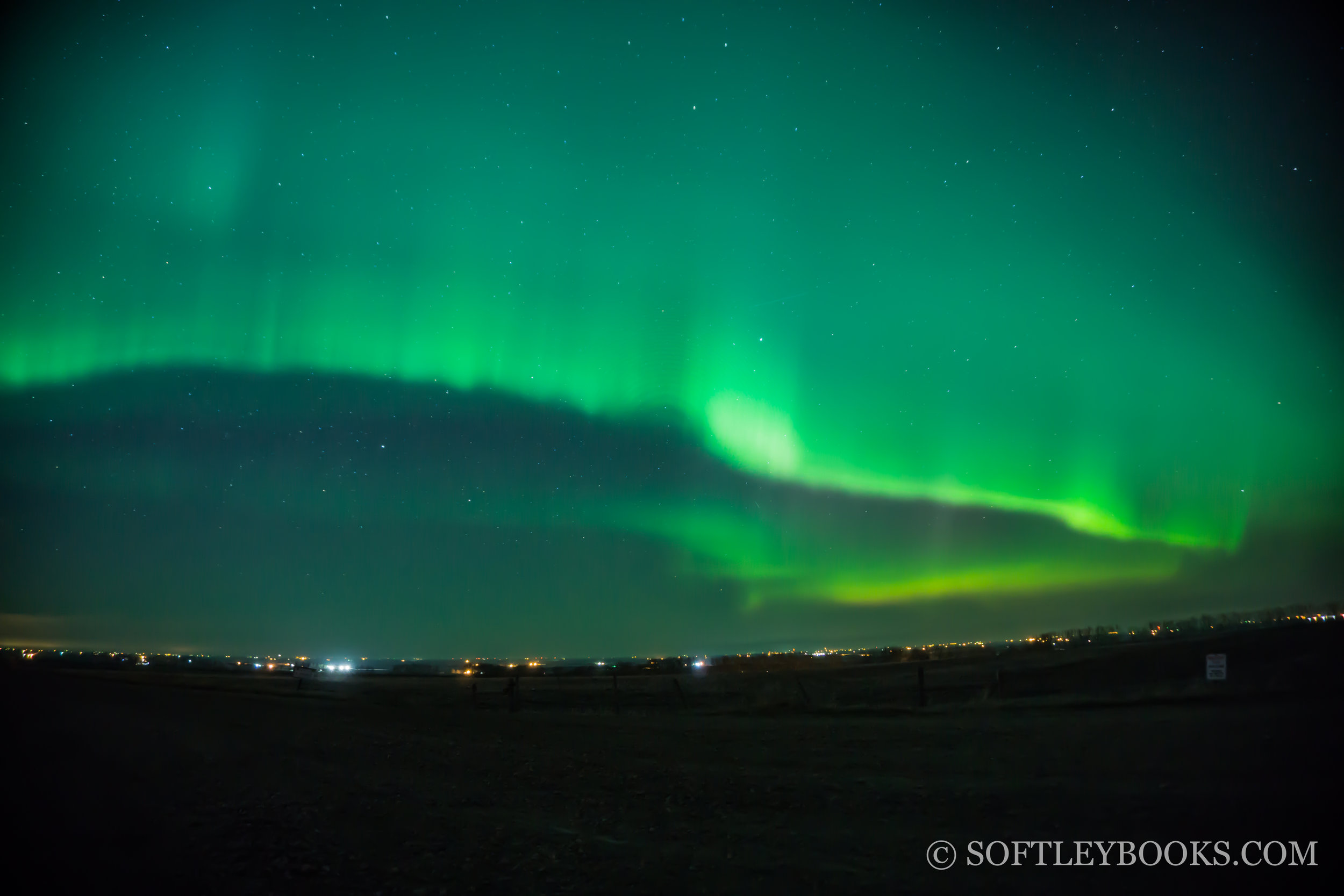
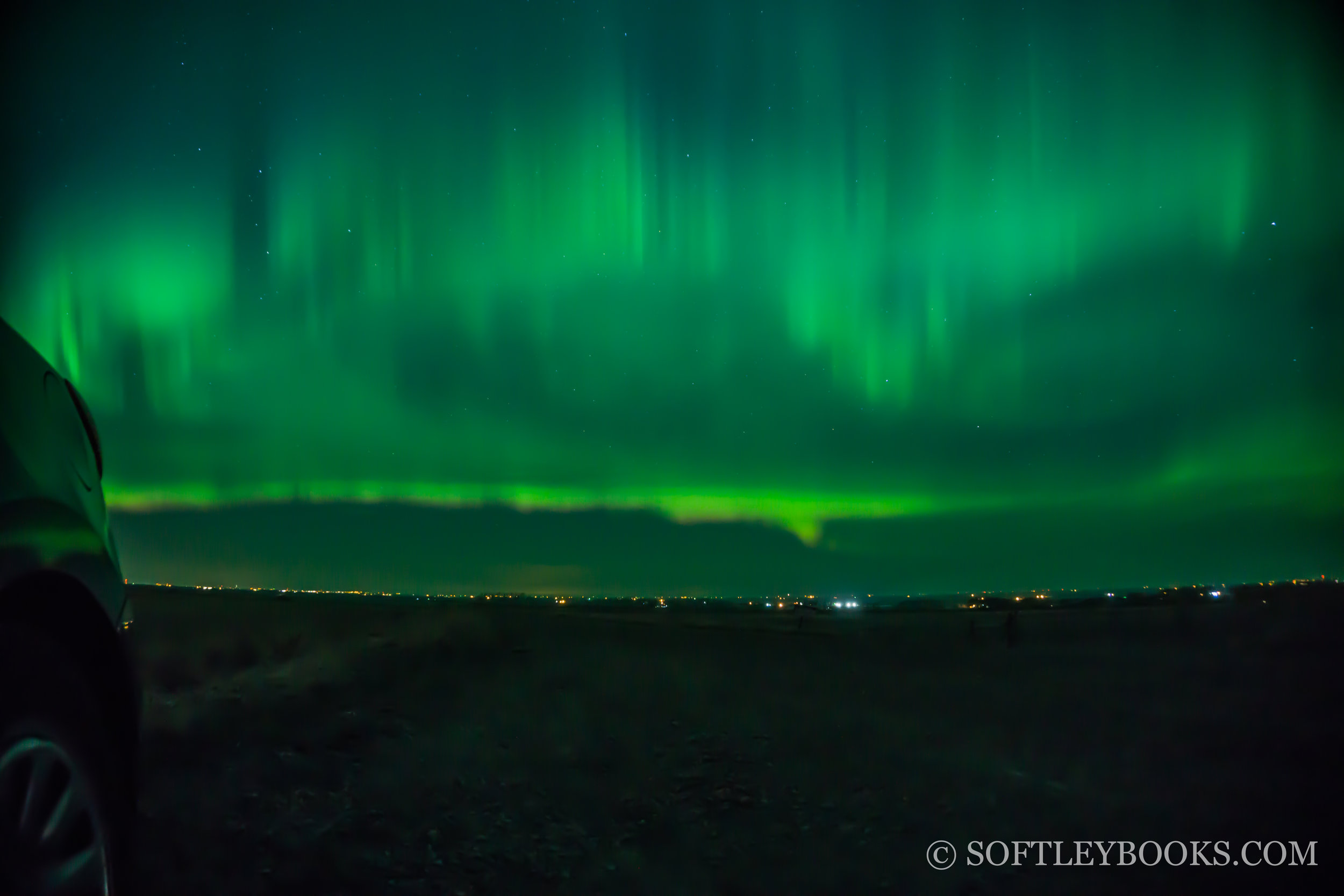
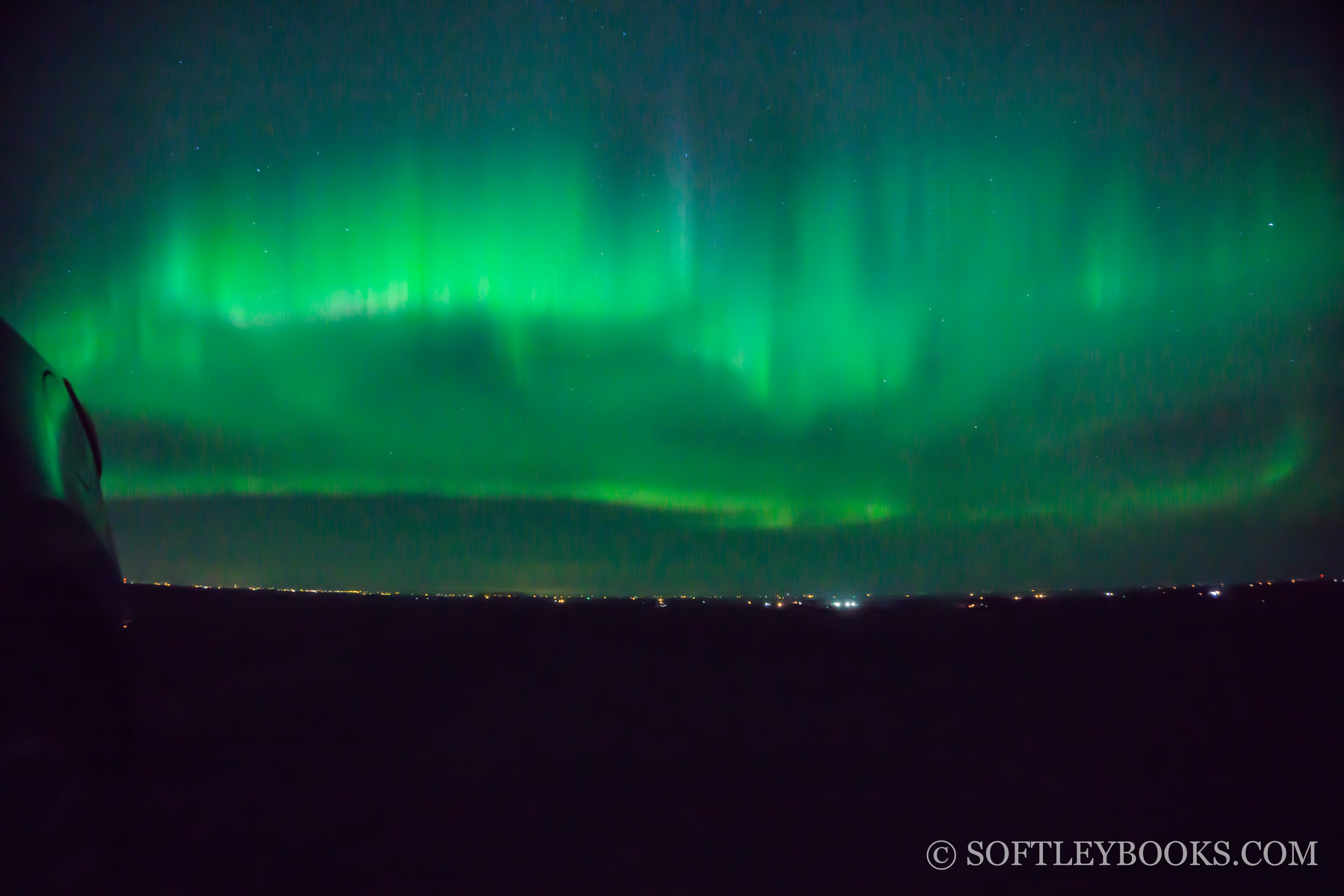
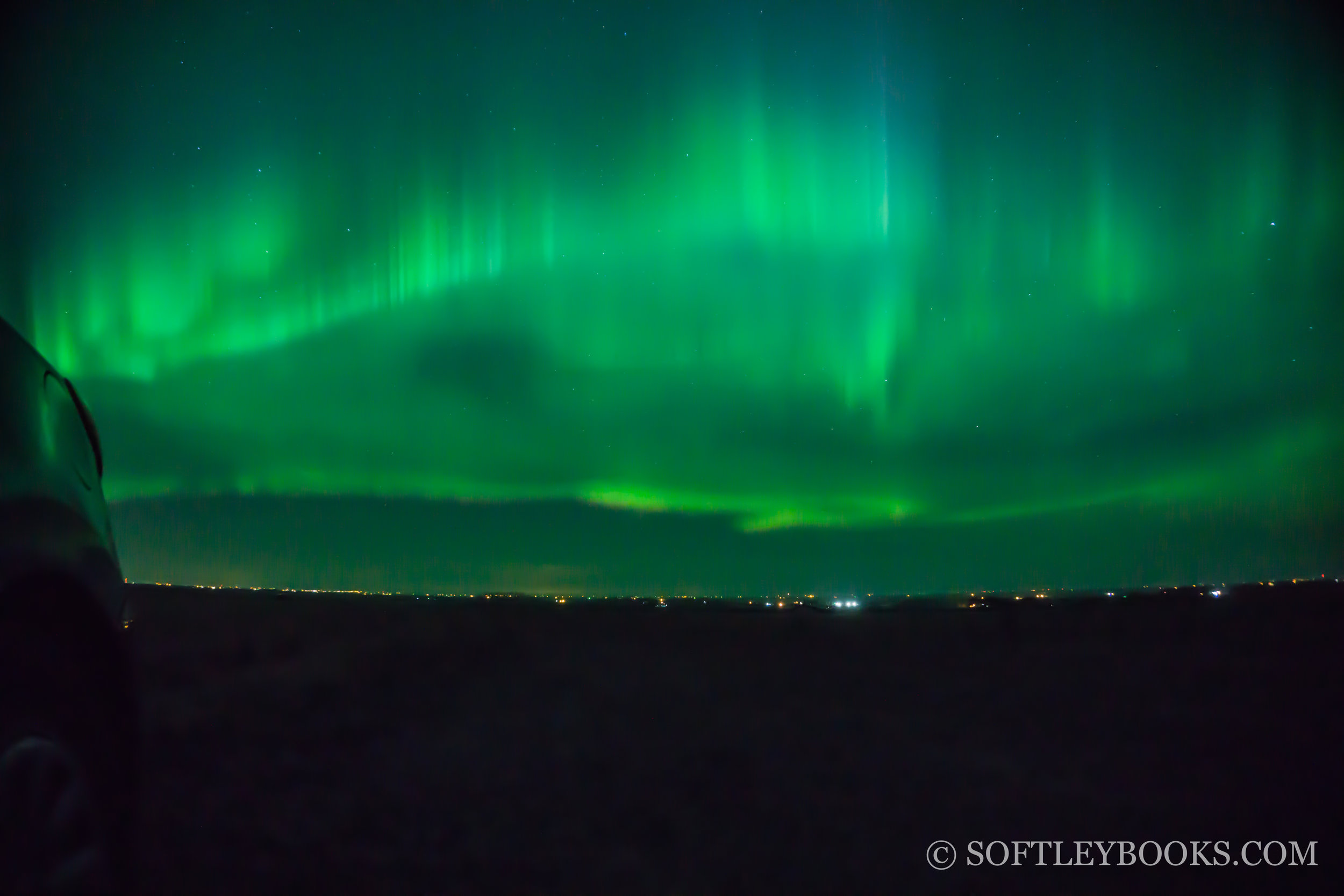
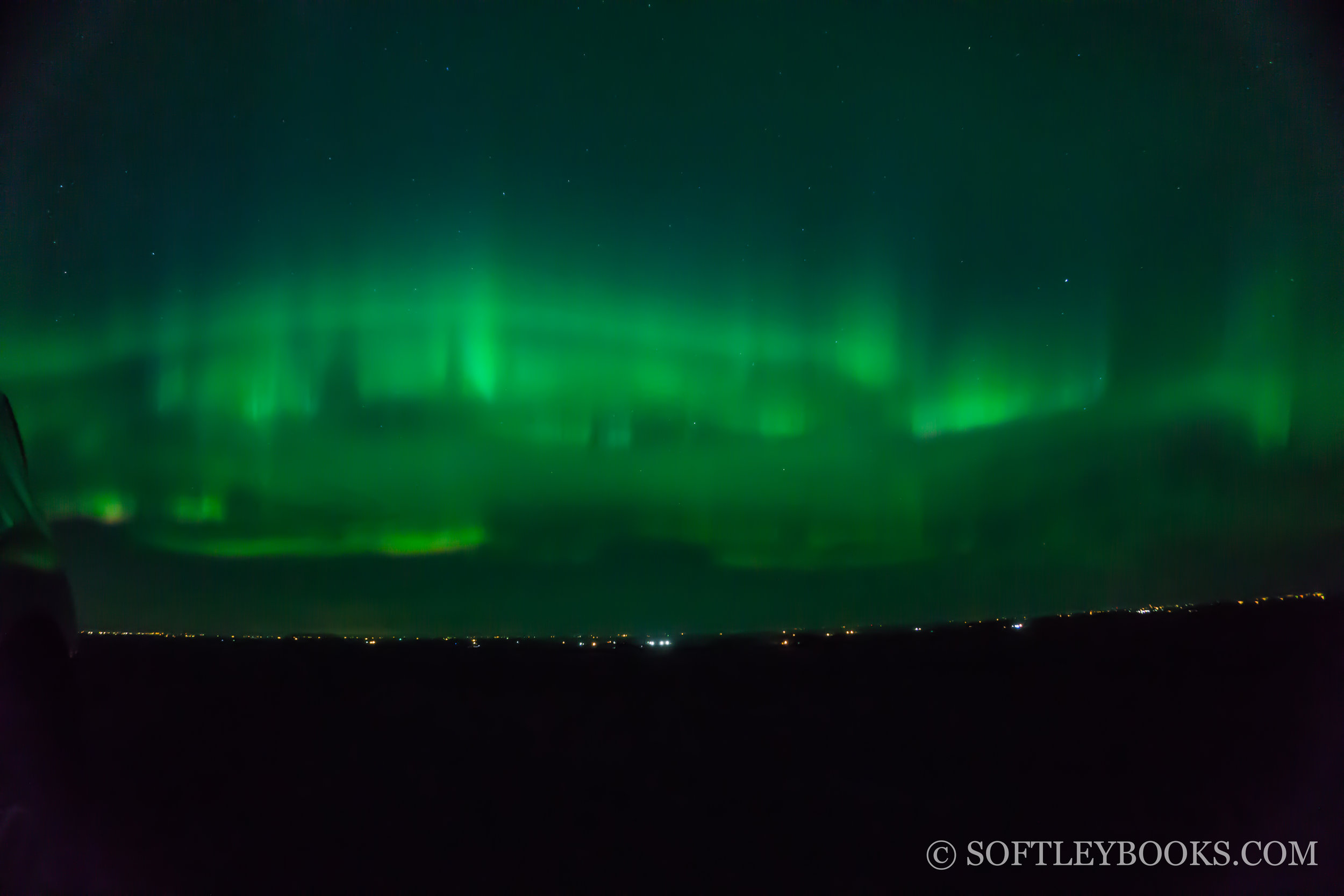
As I grew older, the road trips became my own. I became the pilot of my own craft, navigating by starlight. I learned to balance my gaze between the road and the heavens; became better at catching sight of faint glimmers in my periphery.
Then, I travelled by night and by highway regularly. I taught music late into the evening in small towns several times a week and played gigs all over the map on weekends. My life was well suited to stargazing and writing and thinking, if not very well suited to making money. Still, I worked hard, travelled far and made a reasonable income.
From time to time, as I put more and more kilometres on my poor, under-maintenanced car, I'd catch sight of something truly breath-taking and I'd pull over to watch. Each time it would be like reclaiming a small sphere of silence; a few moments of wonder just for myself. I would be a child again, gazing upward with soft wide eyes.
Over time the travels became more routine. Over time I worried more about getting home than about enjoying a night drive. Over time, I remembered to look up less and less often. My eyes hardened. My routes became stiff and inflexible; my drives automated and robotic.
I gave up my travels with music. The income was a windfall for a young university student; the hours manageable for a tireless night-owl. But it was not the life for a home-owner. It was not the life for the building and strengthening of a relationship. It was not a life that ensured security or comfort.
I completed school. I dropped many of my gigs, retaining only what was most enjoyable or lucrative. I worked predictable hours. I contended with rush hour traffic and construction rather than deer and slow-moving farm equipment.
I don't regret it.
I play music for enjoyment rather than to make ends meet. It has become a bonus rather than a burden. I teach because I love it, not because I need more hours to pay the bills. I travel out of passion rather than necessity. I will not be wealthy, but I am secure.
And yet there are moments. There are times like these. There are times I forget. I forget where I came from. I forget what my life once was and in doing so, I forget some of my earliest pleasures and passions.
The image is difficult to capture. I can't quite grasp it; can't quite pin it down. In fighting rush hour, I forget the joy of night driving. In trying to get home for dinner, I forget what it was like to stop and look up at the stars. In worrying about finances I forget what it was to have no money over which to worry. In working a challenging and consuming job, I forget where thoughts can travel if allowed to wander. The thoughts shift unnoticeably - like the lights. They are fluid; lacking structure.
I see the green luminescence just upon the horizon. Slowly it spills farther, up into the night sky. I allow myself a flicker of pride. I doubt many of the other motorists have seen it. I probably shouldn't have seen it. It is a distraction. I can't keep my eyes on the road. I'm so desperate to follow the lights; so fearful that they will fade away.
I consider for a moment. It's late and I have far to go. I hesitate only a moment.
I careen somewhat recklessly toward the next exit. I know that the exit turns east but little else. I've lost track of where I am on this familiar, routine journey. All my thought is on the sky and, travelling eastward, it is much more difficult to maintain eye contact with the eerie and fickle phenomenon. The eastbound road is still not dark enough. Stealing glances to the north while trying to keep my car from veering drunkenly, I worry that I've lost sight of it.
I see a glittering orange reflector marking a range road up ahead. The reflector is garishly bright; a cheap and jealous imitation of the stars. It drowns them out. The loud things of this world so often overpower the beautiful things. I slow abruptly, checking the scarlet glow of my brake lights in the rearview mirror to ensure that no vehicles are bearing down on me; speeding toward me with hard xenon lances. I am alone on the road. Still I take the turn a little too quickly and skid as the tires hit the gravelled surface of the rural track. A cloud of dust rises around me.
I find as likely a place as possible and pull over. There is a wide shoulder that drops abruptly into a steep ditch full of tough spring weeds. Beyond that is a forbidding barbed wire fence and ragged clumps of mean and tangled brush.
The night is silent or as silent as it may be this near to civilization. Town lights twinkle in every direction but I've found a patch of suitable darkness. At first I turn on my hazard lights. The rhythmic amber flash washes the road, illuminating the surrounding fields and scrub with each vulgar burst. I soon realize that I will have to forgo safety if I am to have any hope of bathing in the more subtle cosmic light.
I extinguish the hazards, looking up and down the road. There is no traffic. I reassure myself that I am far enough from anywhere that it is unlikely a vehicle will strike my darkened car.
I worry only for a moment before I am immersed in the spectacle that sweeps through the sky above me. All concerns are swept away in the ebb and flow of the aurora.
I set up my tripod and camera. I'm not sure why I have it with me, but I'm glad of it. I've never done any night photography before. The images I've captured in my career of stargazing exist only in my mind; my memory. It seems profane, unnatural; even blasphemous to freeze such fluid entities into rigid pixels. They seem to struggle against the camera, desperate not to be caught. Yet I capture them anyway.
I take a few photos; make a few experimental adjustments and fiddle with settings and angles. After a while the camera becomes a barrier; a distraction keeping me from real appreciation of the sky. I'm greedy. The moment is mine alone. I soon forget to reset the timer. Without the camera, the lights seem to calm. They become a fluid dance rather than a series of frozen moments. I lean back against the hood of my car and watch the rippling swirl of green and pink and teal and azure and other colours for which I have no name.
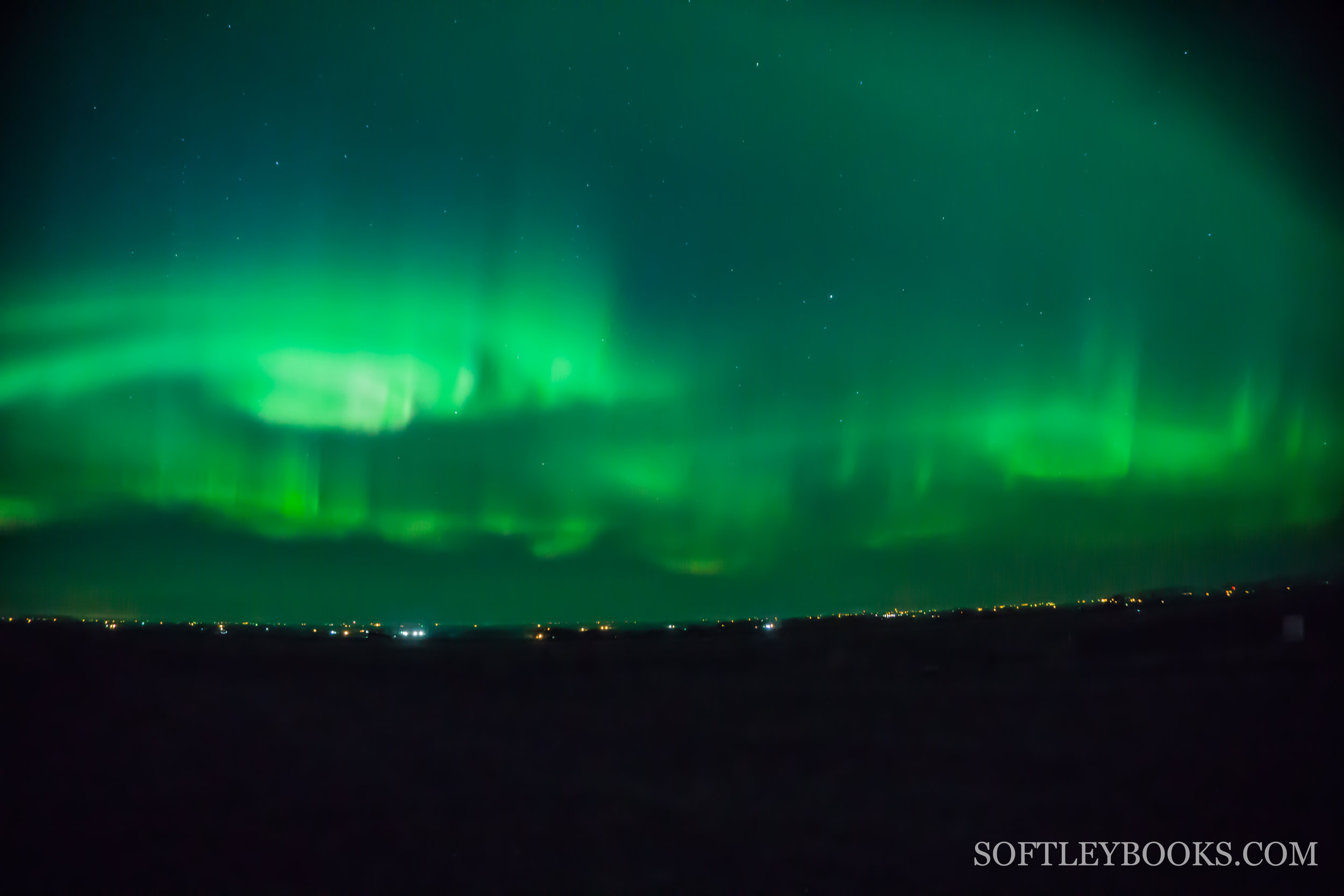
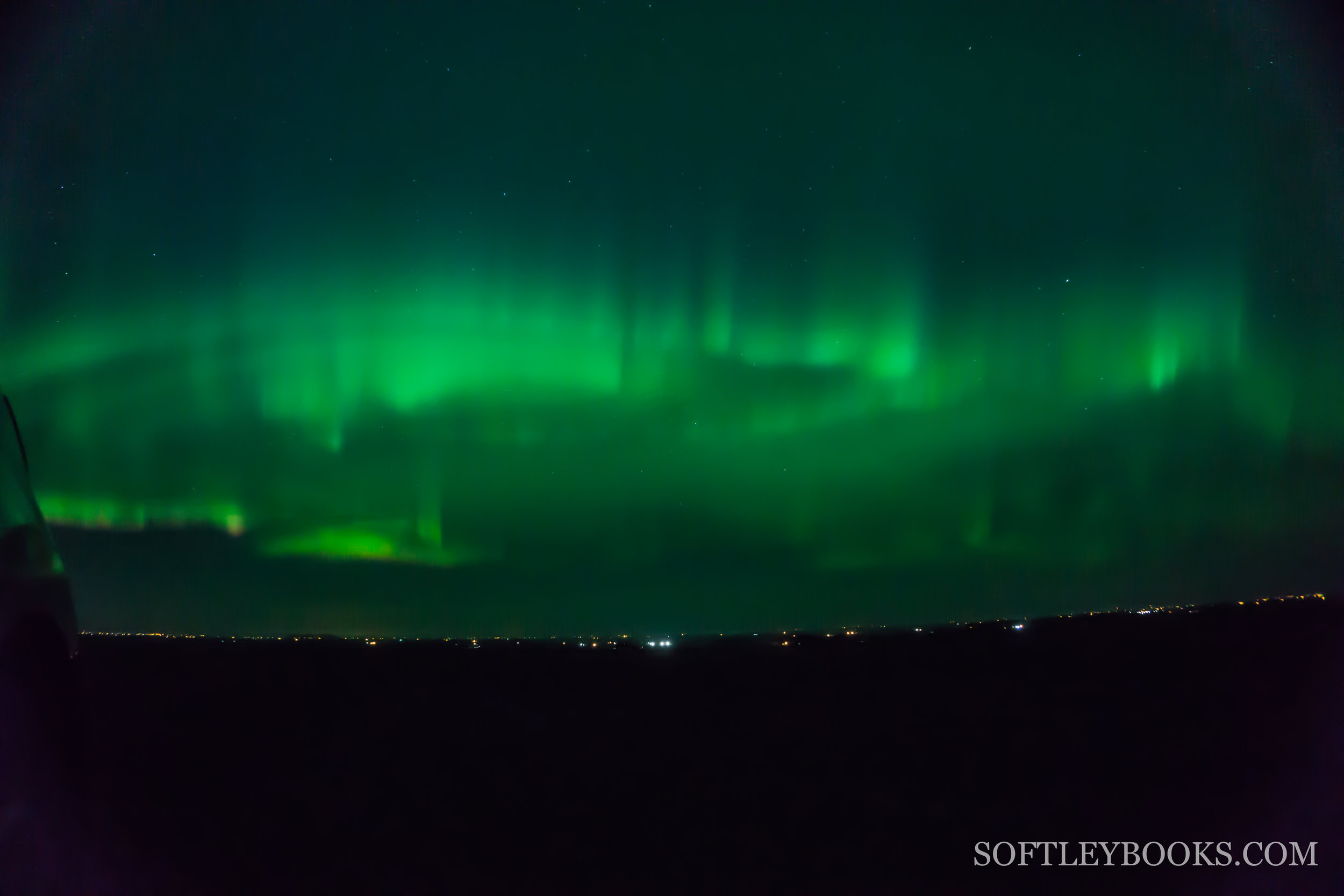
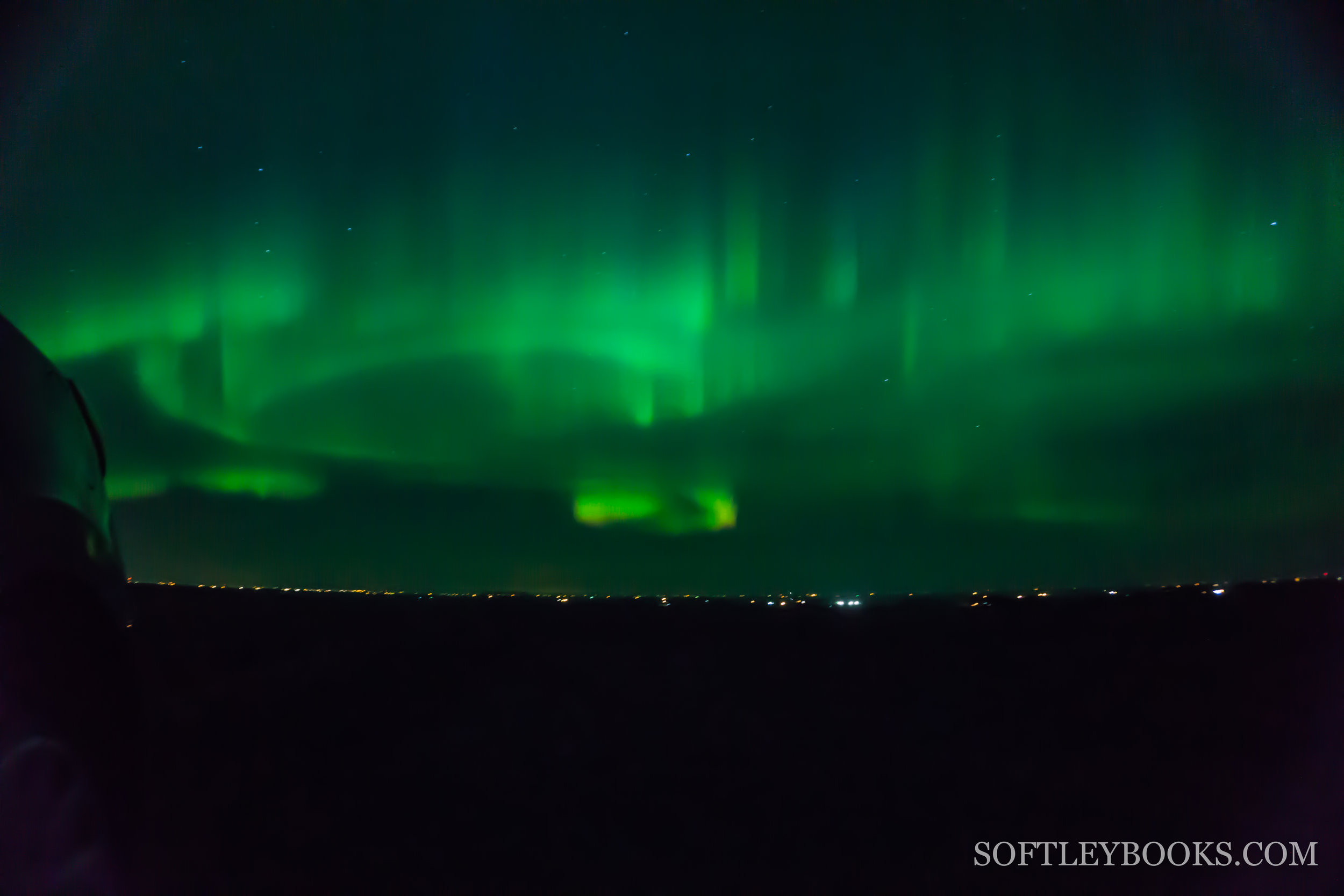
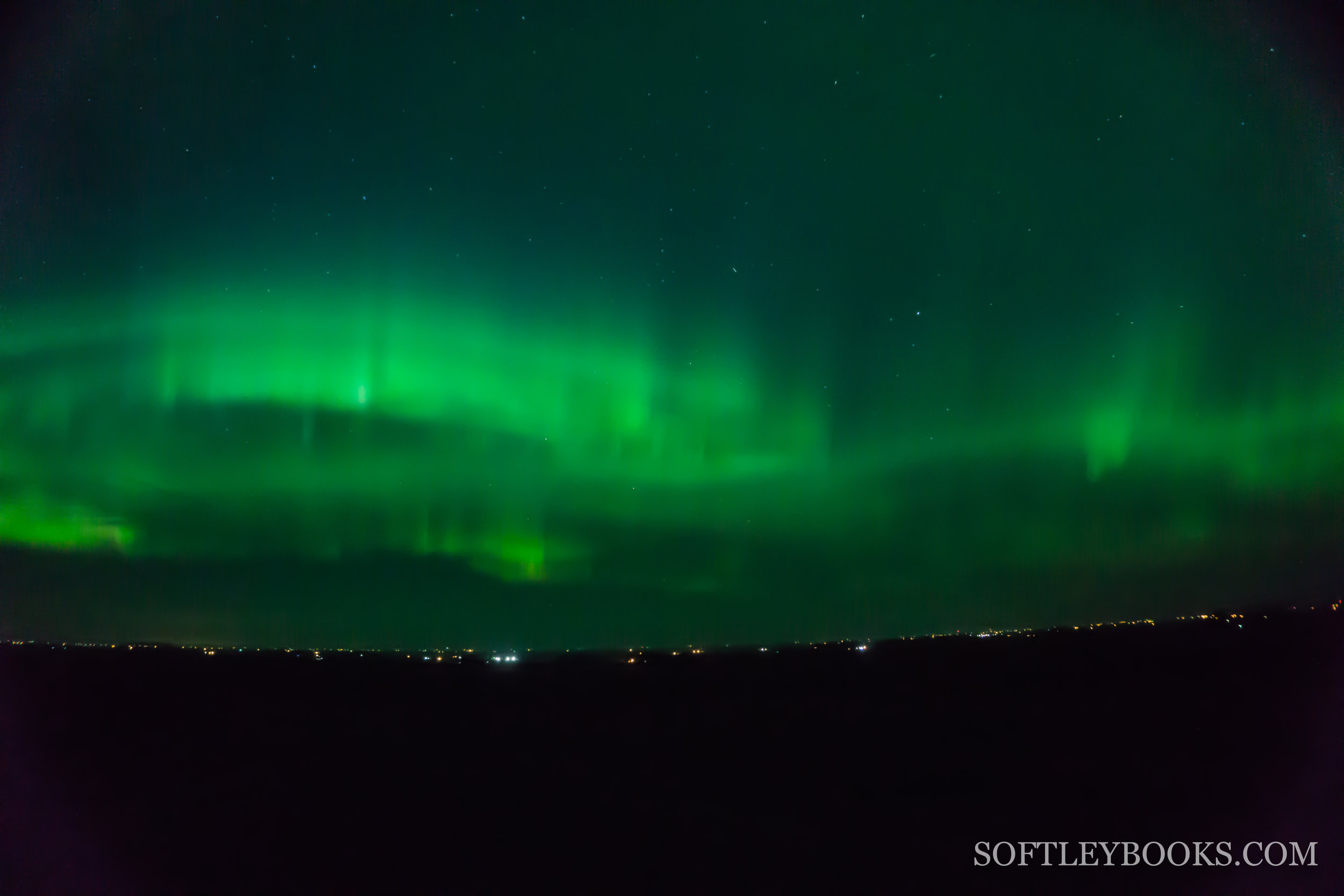
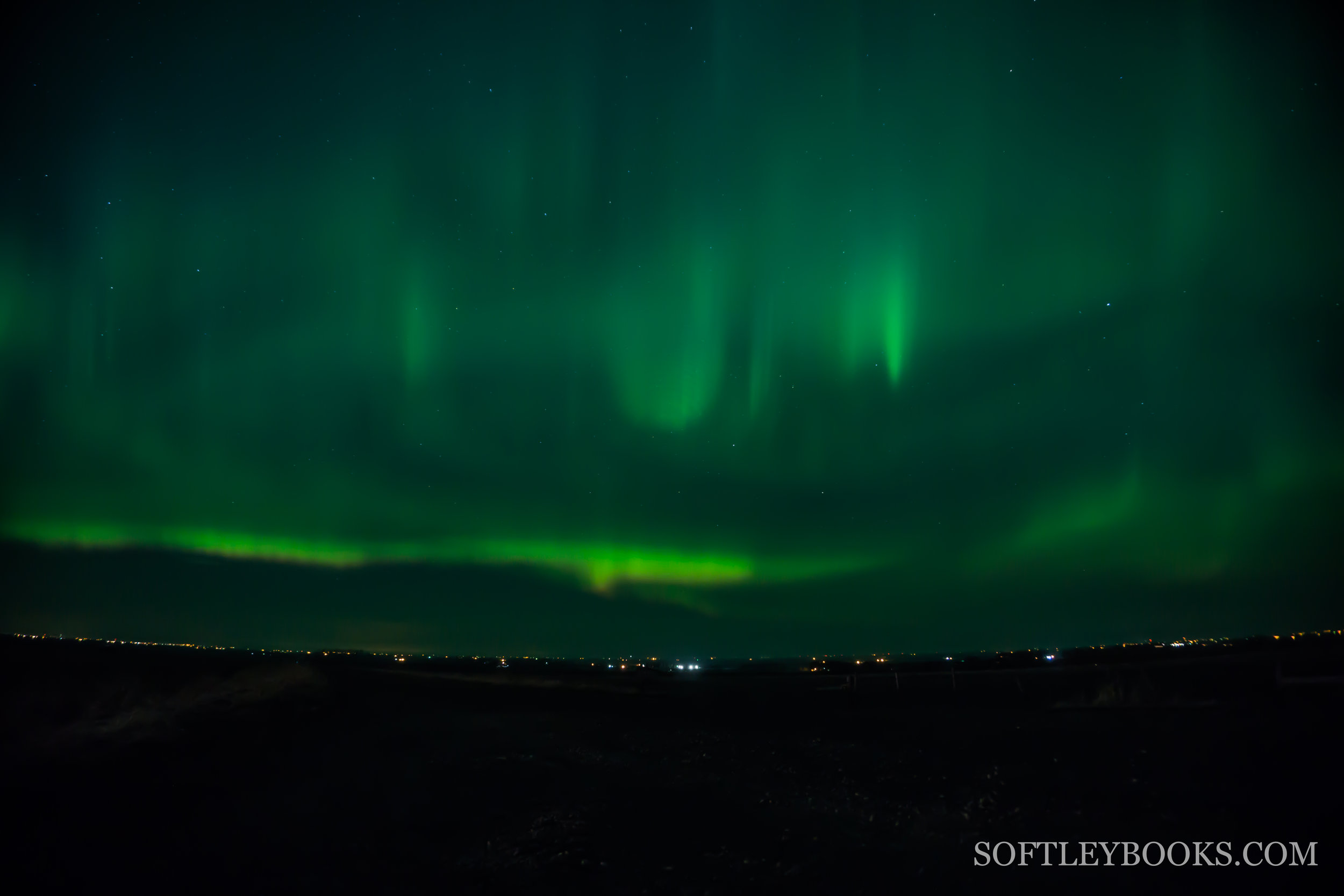
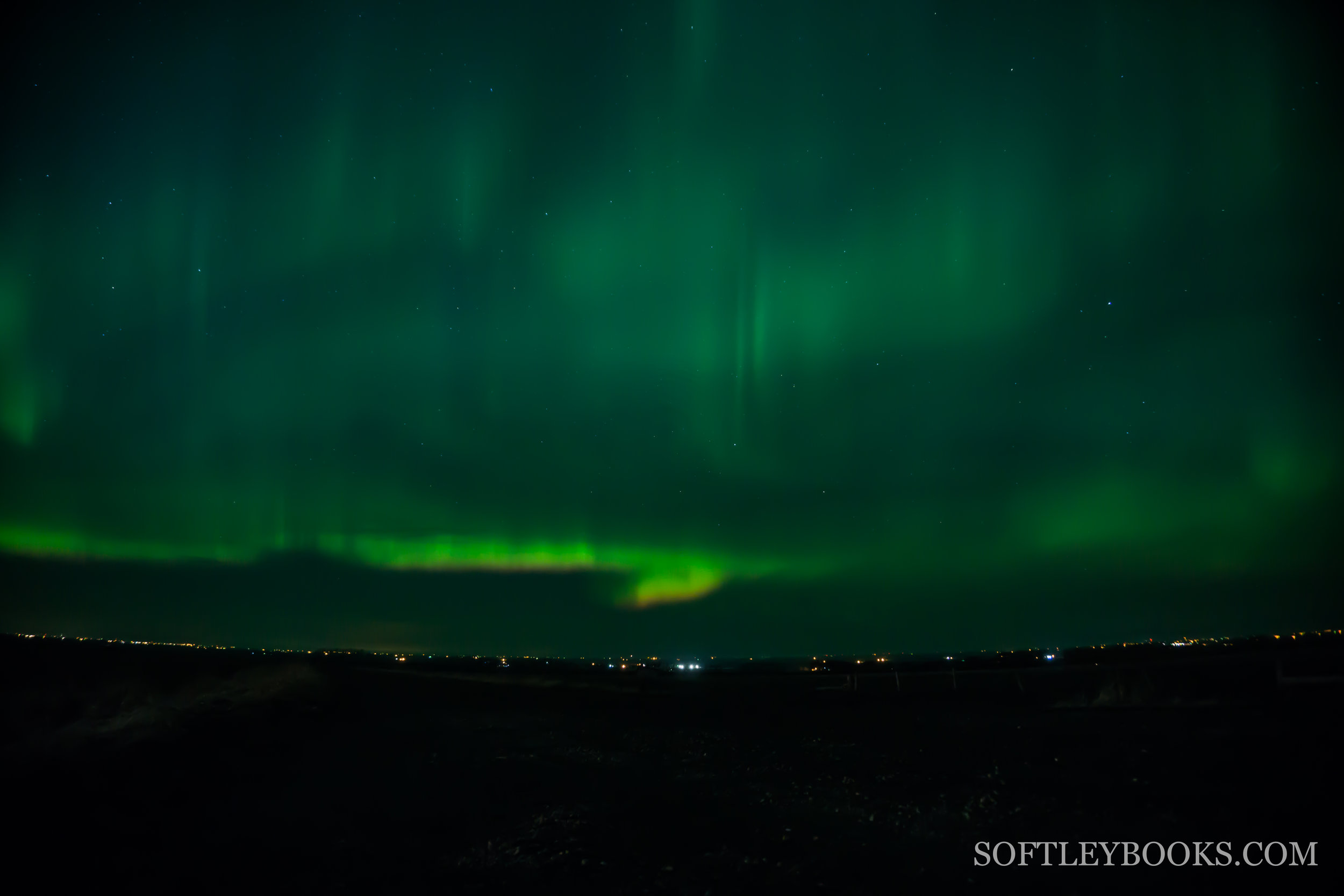
I become cold. The wind blows out of the north and it carries the feel of a spring snow storm - icy chill and dense with humidity. I pretend not to feel it for a while. For half an hour, an hour, an hour-and-a-half. I am a child again. Wonder fills me and I remember telescopes and cottages and lightless lakes and deep snow. It is as though no time has passed; as though I'd never forgotten to look up.
The lights are a swirling tempest, dancing brightly and unabashedly where once they had been a shy and motionless ribbon. I suppress a shiver, determined to watch for as long as I can.
To accompany the sky dance, coyotes begin to howl and shriek and wail all around me. They sing mournfully and they yap excitedly. The hair on the back of my neck rises. They seem to call from all directions at once. Farm dogs bark in warning. The domesticated distrustful baying is drowned out by the unfettered, untameable sounds of celebration. The cacophony grows to a peak. The coyotes seem very near. Beneath a living sky and surrounded by the wild voices of unseen predatory creatures, I begin to feel a slight thrill of fear. My heart livens and a small rush of adrenalin courses through me.
Only two deaths have ever been recorded as a result of coyote attacks. It's one of those strange facts that I know off-hand. Attacks causing injury are only slightly more common. Even so, the sound is haunting and dangerous. It heats the blood in the same way that leaning over a railing on a very tall building does. It flutters the stomach in the way that a patch of turbulence on a flight does. It prickles the scalp in the way that strange noises in a strange house do. I am in no danger. There is not even an illusion of danger. And yet there is a primal part of me that feels a thrill at the raucous and hungry song. Are we biologically designed to fear the wild and unknown or is it the result of our long millennia of gradual domestication? Nature or nurture or both? Such thoughts are lubricated by the light of the aurora.
Even as the lights reach their explosive climax, the voices around me rise in a sudden yapping crescendo.
Prophetically, the coyotes fall silent. As though under the baton of a fastidious conductor the howling abruptly ceases and the plains are suddenly noiseless. Only the cold north wind can be heard rustling dry shrub and grass.
The aurora last only a few moments more before fading as quickly and quietly as they appeared. I am left watching the last dwindling tendrils, wondering if my eyes can be trusted. I look on attentively for a time, tricking myself into sighting a resurgence here and there out of the corner of my eye. Each is a mirage that fades the moment it comes into focus. Though I search in vain, though I struggle to will another green ribbon into being, there is nothing definitive. Only the bright stars shine down.
At last I am forced concede. Without the warmth of the lights and the epinephrine thrill of the coyote song, I begin to feel the cold. The north wind seeps into my skin. A bank of cloud hovers on the horizon, glowing amber with reflected town light. Snow will come soon. I descend to earth and return to life. My eyes drift slowly down to the road.
There is a long way to go and many hours to work when the sun rises.
